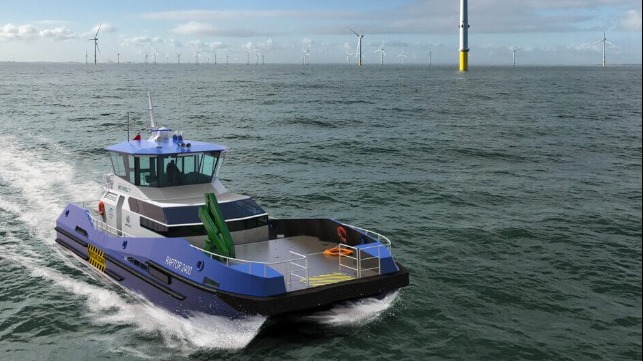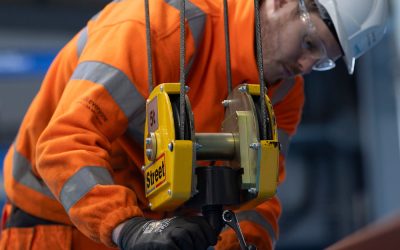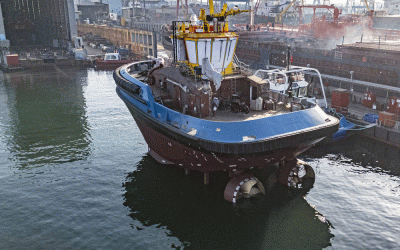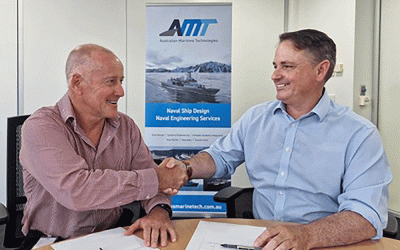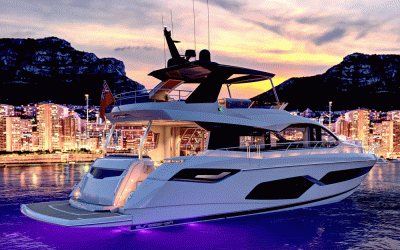Robert Allan Ltd (RAL) has unveiled its RAptor 2400 concept, comprising a crew transfer vessel (CTV) designed to run on green methanol. Developed with the support of the Carbon Trust, UK and its Offshore Wind Accelerator programme, the catamaran will offer an alternative to diesel-electric and LNG-fuelled powertrains, both of which can bump up boat weight and hog onboard space. Burning natural gas also requires the installation of complex cryogenic or pressurised fuel tanks, which are hardly ideal for a compact transit craft.
RAL designed the RAptor 2400 with an eye on anticipated future trends, including the expansion of green methanol bunkering hubs. “The possibility of using green methanol marks a shift from the current linear fuel cycle to a circular fuel cycle, where harmful combustion waste products are converted back into useful fuels,” comments RAL project manager Erik Johnston. “This will have great benefits for generations to come.”
Additionally, renewable energy majors face increasing pressure to demonstrate that they have done their utmost to remove carbon emissions from the offshore wind farm supply chain. While wind power is on something of a global roll now, this methodology has its fair share of critics and bashers, a few of whom won’t hesitate to level charges of hypocrisy against energy firms that commission environmentally pollutive boats.
The RAptor 2400 is powered by four Scania DI16 main engines, all converted to run on methanol by Swedish renewables tech developer ScandiNAOS. Rated 450kW at 2,100rpm each, the engines meet IMO Tier III emission limits without the need for additional exhaust aftertreatment. ScandiNAOS previously worked on a methanol-fuelled pilot boat with the Swedish Maritime Association and Swedish Maritime Technology Forum, and has been involved in methanol-related projects with Stena Line, Silja Line and Wärtsilä.
The CTV was also designed for compliance with IMO’s Interim Guidelines for Safety of Ships Using Methyl/Ethyl Alcohol as Fuel, as well as Lloyd’s Register’s Rules for the Classification of Methanol Fuelled Ships. Each demi-hull houses two of the engines, connected to a dual-input gearbox driving a Servogear controllable-pitch propeller system. Following CFD analysis, RAL calculated that the CTV will be able to achieve a speed in excess of 25knots at full load displacement.
The vessel stores 12m3 of methanol “in loose stainless-steel tanks, located in the aft cross-deck structure between demi-hulls”, Johnston tells Ship & Boat International. “The methanol storage is suitable for about three to four days of typical operations at a wind farm, or a range of about 600nm at 90% MCR.” The demi-hulls also house two cabins: a single for the master and a double for the crew. The CTV will typically operate with three crew and 12 turbine technicians. The technician seating area on the main deck has large forward and side windows, and is designed to grant the technicians stepless movement from the internal seating area to the bow. The foredeck has space for a 10’ ISO container, for the storage of the technicians’ equipment.
Johnston says that the RAptor 2400 concept has already logged interest from various vessel operators. “The work on the methanol CTV has also led to development of a methanol tug design, which we are actively discussing with several major tug operators,” he adds – perhaps an unsurprising move, given RAL’s expertise and heavy involvement in tug design.
TECHNICAL PARTICULARS
RAptor 2400
| Length, oa | 23.8m |
| Breadth, moulded | 8m |
| Draught, moulded | 1.1m |
| Full load displacement | 75tonnes (approx.) |
| Total installed power | 1,800kW |
| Methanol capacity | 12m3 |
| Max speed | 25knots+ |
| Crew | 3 |
| Turbine technicians | 12 |
